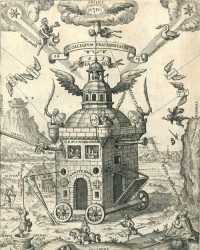Magic
From The Art and Popular Culture Encyclopedia
| Revision as of 21:16, 1 October 2022 Jahsonic (Talk | contribs) ← Previous diff |
Revision as of 22:44, 17 April 2024 Jahsonic (Talk | contribs) Next diff → |
||
| Line 6: | Line 6: | ||
| <hr> | <hr> | ||
| "If we substitute [[mechanics]] for [[magic]] as the operative force used by the [[Creator deity|Creator]], [[John Dee|Dee]]'s religion was perhaps not altogether unlike that of [[Isaac Newton]]."--''[[Theatre of the World]]'' (1969) by Frances Yates | "If we substitute [[mechanics]] for [[magic]] as the operative force used by the [[Creator deity|Creator]], [[John Dee|Dee]]'s religion was perhaps not altogether unlike that of [[Isaac Newton]]."--''[[Theatre of the World]]'' (1969) by Frances Yates | ||
| + | <hr> | ||
| + | "See the [[Apologie pour tous les grands personages faussement soupçonnez de magie |apology]] by [[Gabriel Naudé |Naudé]], for great men accused of [[magic]]. The author there thinks himself obliged to prove that [[Homer]], [[Virgil]], [[Zoroaster]], [[Orpheus]], [[Democritus]], [[Solomon]], [[pope Sylvester]], [[Empedocles]], [[Apollonius]], [[Agrippa]], [[Albertus Magnus]], [[Paracelsus]], &c. never were [[sorcerer]]s."--''[[A Treatise on Man: His Intellectual Faculties and His Education]]'' (1810) by Helvetius | ||
| |} | |} | ||
| [[Image:Splendor Solis.jpg|thumb|right|200px|[[Splendor Solis]] ([[1532]]-[[1535]]) - [[Salomon Trismosin]]]]{{Template}} | [[Image:Splendor Solis.jpg|thumb|right|200px|[[Splendor Solis]] ([[1532]]-[[1535]]) - [[Salomon Trismosin]]]]{{Template}} | ||
Revision as of 22:44, 17 April 2024

Illustration: The Temple of the Rose Cross from the Speculum Sophicum Rhodostauroticum (1618) by Teophilus Schweighardt Constantiens
|
"To establish contact with the mysterious forces which rule the world, to come to terms with them, to obtain their co-operation or complicity, such is the objective of all those who devote themselves to magic and to whom, rightly or wrongly, people attribute supernatural powers and a special gift of receptivity to everything marvellous."--A Pictorial History of Magic and the Supernatural (1961) by Maurice Bessy "If we substitute mechanics for magic as the operative force used by the Creator, Dee's religion was perhaps not altogether unlike that of Isaac Newton."--Theatre of the World (1969) by Frances Yates "See the apology by Naudé, for great men accused of magic. The author there thinks himself obliged to prove that Homer, Virgil, Zoroaster, Orpheus, Democritus, Solomon, pope Sylvester, Empedocles, Apollonius, Agrippa, Albertus Magnus, Paracelsus, &c. never were sorcerers."--A Treatise on Man: His Intellectual Faculties and His Education (1810) by Helvetius |
|
Related e |
|
Featured: |
Magic may refer to:
- Black magic
- Magic (paranormal), a term for various supernatural, mystical, and paranormal practices.
- Magick, a variant term popularized by Aleister Crowley
- Magic in the Greco-Roman world, a branch of the disciplines of Classics, Ancient History and Religious Studies that has become a popular object of study especially in the last twenty years or so
- Magic (illusion), also known as stage magic, street magic, and sleight of hand; the art of entertaining audiences by performing illusions and tricks.
- Magician
- Magic and religion
- Magic realism
- Magic in fiction
- Magus, a Zoroastrian priest; the origin of the word magic
- Magic mushroom
- History of magic
- Timeline of magic
Etymology
From Middle French magique (noun and adjective), from Latin magicus (adjective), magica (noun use of feminine form of magicus), from Ancient Greek μαγικός (magikos, “magical”), from μάγος (magos, “magus”). Displaced native Middle English dweomercraft (“magic, magic arts”) (from Old English dwimor (“phantom, illusion”) + cræft (“art”)), Old English galdorcræft (“magic, enchantment”), Old English drȳcræft (“magic, sorcery”).
See also


